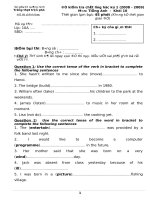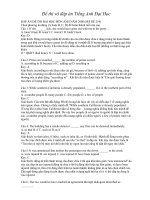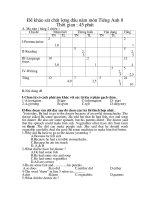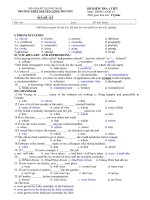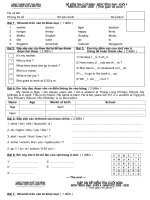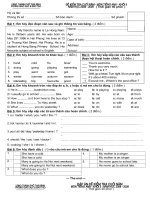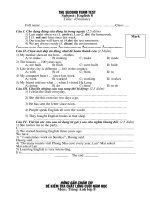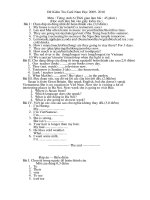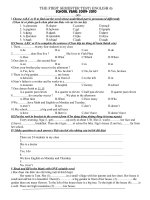ĐỀ đáp án TIẾNG ANH CAO học HUẾ đợt 1 2018
Bạn đang xem bản rút gọn của tài liệu. Xem và tải ngay bản đầy đủ của tài liệu tại đây (188.94 KB, 11 trang )
ĐỀ THI VÀ ĐÁP ÁN MÔN TIẾNG ANH-THI TUYỂN SINH ĐẦU VÀO CAO HỌC HUẾ
ĐỢT 1/2018
PART ONE: READING COMPREHENSION
1. Fill in each blank with a suitable word or phrase taken from the box
without
writing
settle
how
state
those
reach
against
done
play
unleaded
much
continue
from
raise
reminds
enhanced
temper
laughing
whose
1. Don’t invite Mary to the party; I can’t stand her ………………….
tired
laugh
knocked
who
comply
2. Although my sister didn’t speak Japanese, she decided to ………………… in Tokyo.
3. All the visitors are requested to ………………… with the regulations.
4. The government made serious attempts to ………………… the standard of living.
5. No one is to leave building ………………… the permission of the police.
6. This short story ………………… my father of his childhood.
7. His reputation has been greatly ………………… by the success of his new book.
8. Her qualifications are better than ………………… of any other candidates.
9. Some modern cars run on ………………… petrol nowadays.
10. Do you know the man ………………… is interested in reading English books.
11. While his mother was making the salad, someone ………………… on the door.
12. It is ………………… the law to ride a motorbike without a helmet.
13. Matches should be placed out of ………………… of children.
14. The pupils can go out when they are ………………… from studying.
15. There are people who can’t help ………………… when they see someone slipping on a banana skin.
2. Read the following passages carefully and answer the questions below
Passage 1
When Esther left school at the age of sixteen, her aunt gave her £500 for her birthday. Most of Esther’s
friends decided to go to college, but Esther used her aunt’s money to start her own business. She bought
fruit, sugar, and some glass jars and began making her own jam. She sold the jam for £1 ajar to her
friends and she soon doubled her aunt’s £500.
At first her parents didn’t want Esther to spend her time making jam and they thought that sheshould
study instead. They hoped that one day she would be a teacher or a doctor. But Esther didn’t listen to
them. She just kept on making jam. After a few months, she started selling it to the localmarket. Then she
started making orange juice. She sold this to a school where one of her friendsworked.
Sưu tầm: thaygiaotruonglang
1
After two years, her business was very large and her parents were very pleased with her. Shemade all
kinds of food which she sold to shops and supermarkets. She was so busy that she had to getsome people
to work for her.
1. How old was Esther when she left school?
………………………………………………………………………………………………………………..
2. What did Esther do after she left school?
………………………………………………………………………………………………………………..
3. Did Esther’s parents want her to spend her time making jam?
………………………………………………………………………………………………………………..
4. Where did Esther sell orange juice?
………………………………………………………………………………………………………………..
5. What was her business like after two years?
………………………………………………………………………………………………………………..
Passage 2
In 1620, one hundred and twenty people travelled across the Atlantic Ocean. The ship was called the
Mayflower. It left England on September the 6 th. At first the weather was good but later, there were bad
storms at sea.
Eventually, after 2,750 miles, the Mayflower arrived in the “New World” (now America) on November
the 11th. The people on the ship were the first Europeans to live in the “New World”. After this journey,
the Mayflower sailed across the Atlantic Ocean four more times. On its final journey, it left England but it
never arrived in America.
1. How many people travelled across the Atlantic Ocean in 1620?
………………………………………………………………………………………………………………..
2. What was the name of the ship?
………………………………………………………………………………………………………………..
Sưu tầm: thaygiaotruonglang
2
3. What was the weather like at that time?
………………………………………………………………………………………………………………..
4. When did the Mayflower leave England?
………………………………………………………………………………………………………………..
5. When did the Mayflower arrived in the “New World”?
………………………………………………………………………………………………………………..
Passage 3
The Anglo-Saxon people lived in England one thousand years ago. They worked in the fields and they
were also famous for their metal work and jewellery. They made beautiful objects from gold and silver.
In 2009, Birmingham Museum and Art gallery received a phone call about some gold and silver objects in
a field near Birmingham. The next day, archaeologists studied the objects. They were from the AngloSaxon period. In the end, the archaeologists took 1,500 objects from under the ground.
Birmingham Museum showed the objects in 2009 and thousand of visitors came. In fact, the museum
moved the exhibition to a bigger building because so many people wanted to see them. The final value of
the objects was £3,285 million, but for many archaeologists, they are priceless.
1. When were the Anglo-Saxon in England?
………………………………………………………………………………………………………………..
2. What were they famous for?
………………………………………………………………………………………………………………..
3. What did Birmingham Museum and Art gallery receive?
………………………………………………………………………………………………………………..
4. Why did the museum move exhibition to a bigger building?
………………………………………………………………………………………………………………..
5. What was the final value of the objects?
Sưu tầm: thaygiaotruonglang
3
………………………………………………………………………………………………………………..
Passage 4
Ordinary Americans are friendly and not afraid to show their feelings. They are generous, lively and
amusing. They are not as snobbish or class-conscious as the English. Americans’ dream is success in their
job, success earned by their own skill and hard work. There is no one an American admires more than the
self-made man, no matter what kind of family he comes from; whereas upper class people in Britain still
tend to dislike seft-made men and find them socially unacceptable.
1. What are ordinary Americans like?
………………………………………………………………………………………………………………..
2. What are English people like?
………………………………………………………………………………………………………………..
3. What is Americans’ dream?
………………………………………………………………………………………………………………..
4. What does “them” in the final line of the passage refer to?
………………………………………………………………………………………………………………..
5. Give a title for the passage:
………………………………………………………………………………………………………………..
3. Read the passages carefully and then fill in each blank with ONE suitable word
CARTOON FILMS
Cartoon film have very few limits. If you can draw something, you can make it move on the cinema
screen. The use (1) ………………… new ideas and advanced computer programs means that cartoons are
becoming exciting again for people of (2) ………………… ages.
By the (3) ………………… of the 1970s, the cinema world had decided that cartoons were only for (4)
………………….
But soon afterward, one or two directors had some orginal new ideas. They proved that it (5)
………………… possible to make film in which (6) ………………… adults and children could share the
fun.
Sưu tầm: thaygiaotruonglang
4
However, not (7) ………………… cartoon film was successful. The Black Cauldron, for (8)
…………………, failed, mainly because it was too frightening for children and (9) …………………
childish for adults. Directors learnt form this mistake, and the film companies began to make large (10)
………………… of money again.
PART TWO: WRITING
1. Make all the changes and additions necessary to produce complete sentences from the following sets
of words and phrases
Example: I / wonder / why / you / not / reply / my / last letter.
Answer: I was wondering why you had not replied to my last letter.
1.
he / not have / much chance / find / another job / his age / up to now.
………………………………………………………………………………………………………………..
2.
they / very intersted / information / she / just give / them.
………………………………………………………………………………………………………………..
3.
he / lose / job / three years.
………………………………………………………………………………………………………………..
4.
they / negotiate / a new pay deal / boss / moment.
………………………………………………………………………………………………………………..
5.
how long / it / take / you / do / homework.
………………………………………………………………………………………………………………..
6.
parents / go / airport / see / her / off / last Sartuday.
………………………………………………………………………………………………………………..
7.
she / so / busy / she / not come / wedding party.
………………………………………………………………………………………………………………..
8.
Alice / go / participate / workshop / behalf / management staff / company.
………………………………………………………………………………………………………………..
Sưu tầm: thaygiaotruonglang
5
9.
What / you / think / he / ought / do / now?
………………………………………………………………………………………………………………..
10.
completion / town hall / hold up / owing / strike / recently.
………………………………………………………………………………………………………………..
2. Rewrite the following sentences using cue words at the beginning of each sentence so that the
second sentence has the same meaning as the first.
1.
Example:
Lan is too young to see the film.
Answer:
Lan is so young that she cannot see the film.
I’m sorry that I didn’t finish my homework last night.
I wish ………………………………………………………………………………………………..
2.
Susan felt sick, because she ate four cream cakes.
If
Susan
……………………………………………………………………………………………...
3.
They are building a new school in the village.
A new school ………………………………………………………………………………………..
4.
Although he had a good salary, he was unhappy in his work.
In spite ………………………………………………………………………………………………
5.
Are they going to demolish these old houses?
Are these old houses ………………………………………………………………………………..
6.
The switch was too high for him to reach.
He wasn’t tall ……………………………………………………………………………………….
7.
Those pictures are beautiful.
How …………………………………………………………………………………………………
8.
If you don’t rest yourself, you will be ill.
Unless ……………………………………………………………………………………………….
9.
My sister has studied French for two years.
My sister began ……………………………………………………………………………………..
10.
Somebody repaired her car yesterday.
She …………………………………………………………………………………………………..
3. Translation
A. Translate the following sentences into English
1. Châu Phi cần được công nghiệp hóa trong tương lai để cải thiện việc nghèo khổ.
………………………………………………………………………………………………………………..
Sưu tầm: thaygiaotruonglang
6
2. Nếu việc sản xuất tại nhà máy vượt quá chỉ tiêu, các công nhân sẽ được nhạn tiền thưởng.
………………………………………………………………………………………………………………..
3. Phần Lan được xếp vào số những quốc gia hạnh phúc nhất trên thế giới.
………………………………………………………………………………………………………………..
4. Loài chim kiwi ở New Zealand là một loài chim kì lạ vì nó không thể bay được.
………………………………………………………………………………………………………………..
5. Ngày nay, 43% dân số thế giới được kết nối với Internet, hầu hết ở tại các nước đã phát triển.
………………………………………………………………………………………………………………..
B. Translate the following sentences into Vietnamese
1. In 2050, the world must feed 9 billion people. Yet the demand for food will be 60% greater than it is
today.
………………………………………………………………………………………………………………..
………………………………………………………………………………………………………………..
2. On Christmas Eve, family members gather around the Christmas tree to sing traditional songs and then
give presents to each other.
………………………………………………………………………………………………………………..
………………………………………………………………………………………………………………..
3. Because the Islamic religion uses a calendar based on the moon, not the sun, the exact date of religious
festivals changes from year to year.
………………………………………………………………………………………………………………..
………………………………………………………………………………………………………………..
4. Corruption is a major cause of poverty and it can cause an increase in violence.
………………………………………………………………………………………………………………..
Sưu tầm: thaygiaotruonglang
7
5. Achieving gender equality is not only a moral issue but also an economic matter.
………………………………………………………………………………………………………………..
Ghi chú: Cán bộ coi thi không giải thích gì thêm.
ĐÁP ÁN MÔN THI TIẾNG ANH CAO HỌC HUẾ (ĐỢT 1/2018)
PART ONE: READING COMPREHENSION
1. 15 điểm (mỗi câu 1 điểm)
1. temper
2. settle
6. reminds
7. enhanced
11. knocked
12. against
2. 30 điểm (mỗi câu 1,5 điểm)
Passage 1
1. 16/sixteen.
Sưu tầm: thaygiaotruonglang
8
3. comply
8. those
13. reach
4. raise
9. unleaded
14. tired
5. without
10. who
15. laughing
2. She started her own business/ To start her own business.
3. No, they didn’t.
4. She sold it/ orange juice to a school where one of her friends worked.
5. Her business was very large.
Passage 2
1. 120/ one hundred and twenty people.
2. The Mayflower.
3. At first, the weather was good but later, there were bad storms at sea.
4. On September the 6th.
5. On November the 11th.
Passage 3
1. One thousand years ago.
2. Their metal work and jewellery.
3. A phone call about some gold and silver objects in a field near Birmingham.
4. Because so many people wanted to see the objects.
5. £3,285 million.
Passage 4
1. They are friendly, generous, lively amusing and not afraid to show their feelings.
2. They are not as snobbish or class-conscious.
3. Americans’ dream is success in their job, success earned by their own skill and hard work.
4. seft-made men.
5. Ordinary Americans.
3. 10 điểm (mỗi câu 1 điểm)
1. of
2. all
3. end
4. children
5. was
6. both
7. every
8. example
9. too
10. amounts
PART TWO: WRITING
1. 15 điểm (mỗi câu 1,5 điểm)
1. He has not had much chance to find another job at his age up to now.
Sưu tầm: thaygiaotruonglang
9
2. They are very interested in the information she has just given them.
3. He has lost his job for three years.
4. They are negotiating a new pay deal with their boss at the moment.
5. How long does it take you to do your homework?
6. My parents went to the airport to see her off last Sartuday.
7. She was so busy that she didn’t/ couldn’t come to the wedding party.
8. Alice is going to participate in a/ the workshop on behaft of the management staff of the/ my company.
9. What do you think he ought to do now?
10. The completion of the town hall has been held up owing to a strike recently.
2. 15 điểm (mỗi câu 1,5 điểm)
1. I wish I had finished my homework last night.
2. If Susan had not eaten four cream cakes, she would not have felt sick.
3. A new school is being built in the village.
4. In spite of having a good salary (in spite of th fact that he had a good salary), he was unhappy in his
job.
5. Are these old houses going to be demolished?
6. He wasn’t tall enough to reach the switch.
7. How beautiful those pictures are!
8. Unless you rest yourself, you will be ill.
9. My sister began studying French two years ago.
10. She had her car repaired yesterday.
3. 15 điểm (mỗi câu 1,5 điểm)
A. Translate the following sentences into English
1. Africa needs to be industrialized in the future to improve its poverty.
2. If production in that factory exceeds the target, the workers will get a bonus.
3. Finland is rated one of the happiest countries on earth/ in the earth/ in the world.
4. The kiwi in New Zealand is a very strange bird because it cannot fly.
5. Today, 43% of the world population are connected to the Internet, mostly in developed countries.
B. Translate the following sentences into Vietnamese
1. Vào năm 2050, thế giới phải cung cấp thực phẩm cho 9 tỉ người. Tuy nhiên nhu cầu thực phẩm sẽ tăng
tới 60% so với hiện tại.
2. Vào đêm Giáng sinh, các thành viên trong gia đình ngồi quây quần quanh cây (thông) giáng sinh để hát
những bài hát truyền thống và sau đó trao quà cho nhau.
3. Vì Hồi giáo dùng lịch dựa theo mặt trăng, không phải mặt trời nên ngày tháng chính xác của các lễ hội
thay đổi theo từng năm.
4. Tham nhũng là nguyên nhân lớn dẫn tới sự đói nghèo và có thể gây ra sự gia tăng bạo động.
Sưu tầm: thaygiaotruonglang
10
5. Bình đẳng giới không chỉ là vấn đề liên quan đến đạo đức mà còn là vấn đề kinh tế nữa.
-----HẾT-----
Sưu tầm: thaygiaotruonglang
11
